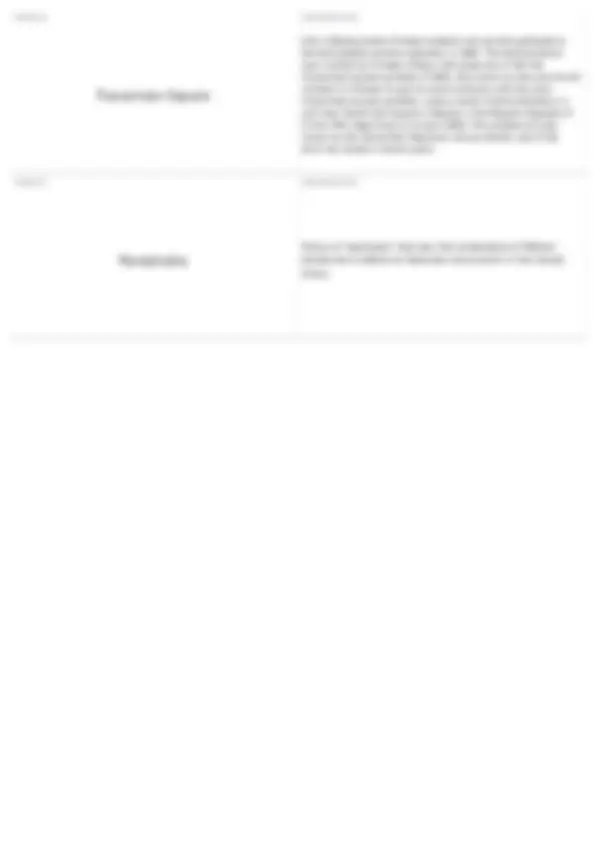












Study with the several resources on Docsity

Earn points by helping other students or get them with a premium plan


Prepare for your exams
Study with the several resources on Docsity

Earn points to download
Earn points by helping other students or get them with a premium plan
Community
Ask the community for help and clear up your study doubts
Discover the best universities in your country according to Docsity users
Free resources
Download our free guides on studying techniques, anxiety management strategies, and thesis advice from Docsity tutors
Class: HIST 202 - World Civilization from 1500; Subject: History; University: Brigham Young University; Term: Fall 2011;
Typology: Quizzes
1 / 18

This page cannot be seen from the preview
Don't miss anything!











A people of modern South Africa whom King Shaka united in
TERM 2
DEFINITION 2 Africans rescued by Britain's Royal Navy from the illegal slave trade of the nineteenth century and restored to free status. TERM 3
DEFINITION 3 Jaja of Opobo (full name: Jubo Jubogha; 1821-1891) was a merchant prince and the founder of Opobo city-state in an area that is now part of Nigeria. Rose from canoe slave to become the head of a major canoe house. Founded the new port of Opobo. TERM 4
DEFINITION 4 A Muslim prince allied to British India; technically, a semi- autonomous deputy of the Mughal emperor. TERM 5
DEFINITION 5 The revolt of Indian soldiers in 1857 against certain practices that violated religious customs; also known as the Sepoy Mutiny.
An elaborate display of political power and wealth in British India in the nineteenth century, ostensibly in imitation of the pageant of the Mughal Empire. TERM 7
DEFINITION 7 A movement and political party founded in 1885 to demand greater Indian participation in government. Its membership was middle class, and its demands were modest until World War I. Led after 1920 by Mohandas K. Gandhi , it appealed increasingly to the poor, and it organized mass protests demanding self-government and independence. TERM 8
DEFINITION 8 South Africans descended from Dutch and French settlers of the seventeenth century. Their Great Trek founded new settler colonies in the nineteenth century. Though a minority among South Africans, they held political power after 1910, imposing a system of racial segregation called apartheid after 1949. TERM 9
DEFINITION 9 Cities opened to foreign residents as a result of the forced treaties between the Qing Empire and foreign signatories. In the treaty ports, foreigners enjoyed extraterritoriality. TERM 10
DEFINITION 10 Between 1838 and 1842, war between Britain and the Qing Empire that was, in the British view, occasioned by the Qing government's refusal to permit the importation of opium into its territories. The victorious British imposed the one-sided Treaty of Nanking on China. Also called the Anglo-Chinese Wars.
The reign of Queen Victoria of Great Britain. The term is also used to describe late-nineteenth-century society, with its rigid moral standards and sharply differentiated roles for men and women and for middle-class and working-class people. TERM 17
DEFINITION 17 A political ideology that originated in Europe in the 1830's. Socialists advocated government protection of workers from exploitation by property owners and government ownership of industries. This ideology led to the founding of socialist or labor parties throughout Europe in the second half of the nineteenth century. TERM 18
DEFINITION 18 German journalist and philosopher, founder of the Marxist branch of socialism. He is known for two books: The Communist Manifesto and Das Kapital. TERM 19
DEFINITION 19 A political ideology that stresses people's membership in a nation ---a community defined by a common culture and history as well as by territory. In the late eighteenth and early nineteenth centuries, nationalism was a force for unity in western Europe. In the late nineteenth century it hastened the disintegration of the Austro-Hungarian and Ottoman Empires. In the twentieth century it provided the ideological foundation for scores of independent countries emerging from colonialism. TERM 20
DEFINITION 20 Italian nationalist and revolutionary who conquered Sicily and Naples and added them to a unified Italy in 1860.
Chancellor (prime minister) of Prussia from 1862 until 1871, when he became chancellor of Germany. A conservative nationalist, he lead Prussia to victory against Austria and France and was responsible for the creation of the German Empire in 1871. TERM 22
DEFINITION 22 Empress of China and mother of Emperor Guangxi. She put her son under house arrest, supported anti-foreign movements, and resisted reforms of the Chinese government and armed forces. TERM 23
DEFINITION 23 The political program that followed the destruction of the Tokugawa Shogunate in 1868, in which a collection of young leaders set Japan on the path of centralization, industrialization, and imperialism. TERM 24
DEFINITION 24 A carpenter who founded the Toyoda Loom works (now Toyota Motor Company) in 1906; ten years later he patented the world's most advanced automatic loom.A Japanese inventor and industrialist. TERM 25
DEFINITION 25 Historians' term for the late-nineteenth- and early-twentieth- century wave of conquests by European powers, the United States, and Japan, which were followed by the development and exploitation of the newly conquered territories for the benefit of the colonial powers.
Economic dominance of a weaker country by a more powerful one, while maintaining the legal independence of the weaker state. In the late nineteenth century, free-trade imperialism characterized the relations between the Latin American republics, on the one hand, and Great Britain and the United States, on the other. TERM 32
DEFINITION 32 Leader of the Bolshevik (later Communist) Party. He lived in exile in Switzerland until 1917, and then returned to Russia to lead the Bolsheviks to victory during the Russian Revolution and the civil war that followed. TERM 33
DEFINITION 33 Radical Marxist political party founded by Vladimir Lenin in
DEFINITION 34 Austrian journalist and founder of the Zionist movement urging the creation of Jewish national homeland in Palestine. TERM 35
DEFINITION 35 Statement issued by Britain's Foreign Secretary Arthur Balfour in 1917 favoring the establishment of a Jewish national homeland in Palestine.
Prompted by two or more individuals' claim as successor to a deceased or deposed monarch. The individuals are supported by competing factions within the royal court and foreign powers might also intervene through allying themselves with a faction. TERM 37
DEFINITION 37 German physicist who developed the theory of relativity , which states that time, space, and mass are relative to each other and not fixed. TERM 38
DEFINITION 38 International organization founded in 1919 to promote world peace and cooperation but greatly weakened by the refusal of the United States to join. It proved ineffectual in stopping aggression by Italy, Japan, and Germany in the 1930's, and it was superseded by the United Nations in 1945. TERM 39
DEFINITION 39 Nationalist political party founded on democratic principles by Sun Yat-sen in 1912. After 1925, the party was headed by Chiang Kai-shek, who turned it into an increasingly authoritarian movement. TERM 40
DEFINITION 40 Chinese military and political leader. Succeeded Sun Yat-sen as head of the Guomindang in 1923; headed the Chinese government from 1928 to 1948; fought against the Chinese Communists and Japanese invaders. After 1949 he headed the Chinese Nationalist government in Taiwan.
A prison or labor camp in the former Soviet Union, to which opponents of the government were sent. Where perhaps a million died each year of exposure of malnutrition. To its victims the terror seemed capricious and random. Yet it turned a sullen and resentful people into docile hard-working subjects of the party. TERM 47
DEFINITION 47 Fascist dictator of Italy (1922-1943). He led Italy to conquer Ethiopia (1935), joined Germany in the Axis pact (1936), and allied Italy with Germany in World War II. He was overthrown in 1943 when the Allies invaded Italy. TERM 48
DEFINITION 48 Italian political party created by Benito Mussolini during World War I. It emphasized aggressive nationalism and was Mussolini's instrument for the creation of a dictatorship in Italy from 1922 to 1943. TERM 49
DEFINITION 49 In Nazi ideology, a white person of non-Semetic descent regarded as racially superior. TERM 50
DEFINITION 50 A period in which an economy is greatly affected by unemployment, low output, and poverty.
Leader of the Chinese Communist Party. He led the Communists on the Long March and rebuilt the communist Party and Red Army during the Japanese occupation of China. After World War II, he led the Communist to victory over the Guomindang. He ordered the Cultural Revolution in 1966. TERM 52
DEFINITION 52 The 6,000-mile flight of Chinese Communists from southeastern to north-western China. the communists, led by Mao Zedong, were pursued by the Chinese army under orders from Chiang Kai-shek. The four thousand survivors of the march formed the nucleus of a revived Communist movement that defeated the Guomindang after World War II. TERM 53
DEFINITION 53 Margaret Higgins Sanger (September 14, 1879- September 6, 1966) was an American sex educator, nurse, and birth control activist. An american radical leader of the birth- control movement. TERM 54
DEFINITION 54 Leader of the Indian independence movement and advocate of nonviolent resistance. After being educated as a lawyer in England, he returned to India and became leader of the Indian National congress in 1920. He appealed to the poor, led nonviolent demonstrations against British colonial rule, and was jailed many times. Soon after independence he was assassinated for attempting to stop Hindu-Muslim rioting. TERM 55
DEFINITION 55 The Hindu, Buddhist, and Jain philosophy of revering all life and refraining from harm to any living thing. Nonviolence.
Dictator of Brazil from 1930 to 1945 and from 1951 to 1954. Defeated in the presidential election of 1930, he overthrew the government and created Estado Novo ("New State"), a dictatorship that emphasized industrialization and helped the urban poor but did little to alleviate the problems of the peasants. TERM 62
DEFINITION 62 An economic system aimed at building a country's industry by restricting foreign trade. It was especially popular in Latin American countries such as Mexico, Argentina, and Brazil in the mid-twentieth century. It proved successful for a time but could not keep up with technological advances in Europe and North America. TERM 63
DEFINITION 63 President of Argentina. As a military officer, he championed the rights of labor. Aided by his wife Eva Duarte Peron, he was elected president in 1946. He built up Argentinean industry, became very popular among the urban poor, but harmed the economy. TERM 64
DEFINITION 64 A Vietnamese revolutionary who was the founding leader of the Viet Nam Quoc Dan Dang, the Vietnamese Nationalist Party. He was captured and executed by the French colonial authorities after the failure of the Yen Bai mutiny. TERM 65
DEFINITION 65 Winston Churchill's term for the Cold War division between the Soviet-dominated EAst and the U.S.-dominated West.
The ideological struggle between communism (soviet Union) and capitalism (United States) for world influence. The Soviet Union and the United States came to the brink of actual war during the Cuban missile crisis but never attacked one another. The Cold War came to an end when the Soviet Union dissolved in 1991. TERM 67
DEFINITION 67 International organization founded in 1945 to promote world peace and cooperation. It replaced the League of Nations. TERM 68
DEFINITION 68 Foreign policy initiated by U.S. president Harry Truman in
DEFINITION 69 Conflict that began with North Korea's invasion of South Korea and came to involve the United Nations (primarily the United States) allying with South Korea and the People's Republic of China allying with North Korea. TERM 70
DEFINITION 70 Conflict pitting North Vietnam and South Vietnamese communist guerrillas against the South Vietnamese government, aided after 1961 by the United States.
A change in the rates of population growth. Before the transition, both birthrates and death rates are high, resulting in a slowly growing population; then the death rate drops but birthrate remains high, causing a population explosion; finally the birthrate drops and the population growth slows down. This transition took place in Europe in the late nineteenth and early twentieth centuries, in North America and East Asia in the mid-twentieth, and, most recently, in Latin America and South Asia. TERM 77
DEFINITION 77 The percentage of children who died before their first birthday. TERM 78
DEFINITION 78 The time in a woman's life when menstruation diminishes and ceases, usually between the ages of 45 and 50. TERM 79
DEFINITION 79 Generated by demographers, clearly illustrate the profound transitive patterns and life expectancy in since World War II. TERM 80
DEFINITION 80 During the cold War, local or regional wars in which the superpowers armed, trained, and financed the combatants.
Socialist politician elected president of Chile in 1970 and overthrown by the military in 1973. He died during the military attack. TERM 82
DEFINITION 82 War waged by the Argentine military (1976-1982) against leftist groups. Characterized by the use of illegal imprisonment, torture, and executions by the military. TERM 83
DEFINITION 83 Shi'ite philosopher and cleric who led the overthrow of the shah of Iran in 1979 and created an Islamic republic. TERM 84
DEFINITION 84 Collective name for South Korea, Taiwan, Hong Kong, and Singapore---nations that became economic powers in the 1970's and 1980's. TERM 85
DEFINITION 85 (NIEs) Rapidly growing, new industrial nations of the late twentieth century, including the Asian Tigers.